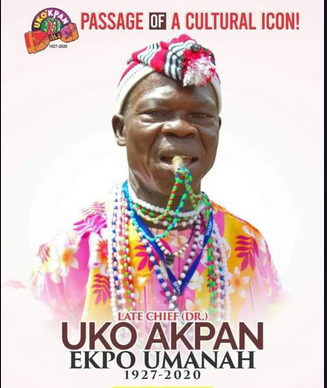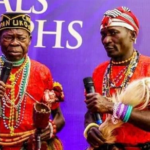Profile of Dr. Uko Akpan Ekpo Umanah: A Cultural Avatar (1927-2020)
Uko Akpan Ekpo Umanah, simply and famously known as Uko Akpan, was born in 1927 into the family of Chief Akpan Ekpo Umanah and Mrs Adiaha Eyara Akpabio both of whom hailed from Ikot Obong village in Afaha Obong clan in Abak Local Government Area of Akwa Ibom State. He was the first son of his parents, and by the gift of hindsight naming him Uko (dignity) seems to have been a stroke of spotless clairvoyance. Uko Akpan never had any formal education, but he was well groomed by his parents in the art of upright living.
His father, a connoisseur of culture, easily became the leader of such cultural groups as Ekpo, Ekong and Abon. Uko Akpan innocuously made himself a dedicated student of his father’s cultural displays because he apparently wanted to become a chip off the old block. The young and supple Uko Akpan was proving at that early age to be a child prodigy. For most people it is easy to dance forward and sideways when the music moves them. Uko Akpan could do this and more. He was also able to dance backwards with unbelievable ease. In addition, he could bend down gracefully to pick anything on the ground with his mouth. Anytime his father was going out for rehearsals he opted to follow him, but the old man would command him to go back home. Uko Akpan would burst into tears and would remain inconsolable for the whole day.
By 1945 his father had died and Uko Akpan, a lanky 18-year old, decided that he would pave a wider path for himself in the cultural arena than his father did. He set up his own cultural group which he called Mbu Ukpat. Mbu Ukpat was a group for both sexes, with men standing on one side and women on the other. It was in the shape of a bridal dance. Both sexes would dance gently and then run quickly to embrace each other. The name of the group was changed to Unek Ntamma (Jumping Dance) and a little later to Nkaakang to reflect the fact that the plays were performed without instruments. However, to infuse more life into their performances, he considered the introduction of instrumentation a desideration. He bought the exciting instrument called “ntakrok”. Both Unek Ntamma and Nkaakang were usually played at night under the bright canopy of the moon. For most people, it was a fitting mode of relaxation after a hard day at the farm or in the market. Cultural entertainment in those days was not a full-time engagement because it was not a profession that, on its own, could provide enough money for sustenance of the family. To supplement his income Uko Akpan traded in crayfish, cowpea and pepper during the day. As a hardworking man who utilized night and day for both his cultural display and meagre mercantilism, he was able to keep body and soul together until fame found him. When fame came, fortune was not far behind. Petty trading ceased to be an attraction for him.
Uko Akpan got married to his first wife Ima from Ikot Ukpong village in Afaha Obong clan in 1961. He later married his second wife Idongesit from Atai Otoro and his third wife Angela from Abibit Afaha Obong. Uko Akpan had 10 children; three of them died while seven are alive today. Uko Akpan was a practising Christian who was baptized in the Church of Jesus Christ. He later joined Sanctified Mount Zion Church, Ikot Ukpong Assembly, where he rose to become the Church’s President and Choir Patron.
His Legacy: A sage once said that “appreciation is something that comes to a man after death and to a woman after divorce.” In Uko Akpan’s case, appreciation, tons of it, came to him long before his death. For all of the 74 years that he practised his art and craft, appreciation accompanied him like a shadow. At the zenith of his popularity he was a much sought after entertainer at high profile events hosted by the Akwa Ibom State Government and heavy hitters in the state and beyond. Uko Akpan’s exertions as a singer, composer, oral poet, dancer and balladist have been amply documented in videos and newspaper articles. A group known as Nta Ifiok Annang Association (Annang professors and Ph.Ds) have teamed up to produce a book titled: “Uko Akpan Memorial Studies” which contains international peer review articles on Uko Akpan’s music. In 2015 Uko Akpan, who had no formal education whatsoever, was decorated with an honorary doctorate degree in Music by the University of Uyo, Akwa Ibom State. Before then, in 2011, a Professor in the Department of English, University of Jos, Uwemedimo Enobong Iwoketok had written a book titled “Beyond Entertainment: A study of Uko Akpan, the Ekere of Akwa Ibom State.” In the book the author says that Uko Akpan’s songs are regarded as “formidable instruments for social control, a potent ideological tool for opening the eyes of the masses to the realities of governance, politics and the dangers of political vandals and sycophants.” In his own remarks Eno Abasi Urua, a Professor of Linguistics at the University of Uyo who wrote the Foreword to Mrs Iwoketok’s book stated that “the artist is a bold and fearless social commentator and critic. Some of the themes from the artiste’s songs include those of oppression, religious bigotry, hypocrisy, immorality, politics, social, cultural and matters of overall human concerns.” It is Mark Twain who said that “it is better to deserve honours and not have them than to have them and not deserve them.” For every honour Uko Akpan has received, every award he has got, there is manifest evidence that he truly deserved them. His songs, about 200, are neither pedestrian nor pedantic, but they are obviously largely didactic; they are meant to give a message, to teach a lesson, to touch the raw nerves of those who hear them and to leave them thinking of the lasting import of the message.
In a way, his music is liberation music, much like Fela Anikulapo Kuti’s music but distinctly non-confrontational and non-caustic. The originality of his music, the improvisation, inventiveness as well as the timelessness of the themes of his songs combine to give his music the flavour of all-time contemporaneity. The song that shot him into prominence was entitled Calabar-Itu Road which was done in commemoration of the opening of the road that linked Cross River and Akwa Ibom States during the President Shehu Shagari era. During the international Festival of Arts and Culture held in Lagos in 1977 Uko Akpan was a participant. Two other songs that took him to the zenith of his career were Dr Pepper, a drink that was very popular in Akwa Ibom at the time and Udoji, the salary windfall granted by General Yakubu Gowon to public servants in 1974. Uko Akpan’s songs condemned many aspects of Nigeria’s life of negativity such as corruption, greed, poverty, exploitation and war while he extolled such virtues as fair-play, justice, unity, conflict management and togetherness. Uko Akpan was not just a composer and singer, he was also a dancer.
Uko Akpan was built like a palm tree, tall and stately, that item that gave Akwa Ibom and Nigeria its resource relevance in the 50s and 60s; but which has been thoughtlessly neglected over the years despite its abiding relevance in Malaysia, Indonesia and elsewhere. Uko Akpan can also be compared to a television set which delivers to you exciting sight and sonorous sound when you pinch it. Uko Akpan, the dancer, is built like a dancer because he possesses what the pop icon Michael Jackson called “a dancer’s body.” A dancer’s body has no bulges here and there; it is smooth like a rail; it is straight like an arrow. Uko Akpan possessed a vast volume of athleticism which made the fluidity of his gyration magical, memorable. It is when he makes those mesmerising movements of his legs, hands and waist that you begin to notice that poetry is in motion. His choreography was so effortless that he made dancing look easy even though it is not. Dance as a performing art has both symbolic and aesthetic components. In Nigeria song and dance almost always go together and constitute important components of ceremonies such as weddings, burials, births, opening of community projects etc. They epitomise either grief or happiness. Uko Akpan’s dance was of the folkloric variety. His songs and his dance were made for each other the way certain types of music were made for well-known dance forms such as waltz, tango, disco and salsa. Like Siamese twins his music and dance were inseparable. The culture of a people is often expressed in several ways including music, dance, religion, clothing, language, art, dishes and buildings. These constitute in a large part the cultural heritage of a people. In the modern era, globalization and technology are threatening to impose on the world a universal culture that is alien to our indigenous culture. The merit of the Uko Akpan legacy is that if protected, Annang culture may not suffer from any form of unmerited diffusion or acculturation. The other merit of the Uko Akpan legacy is that his songs and proverbs and ballards are rendered in unadulterated Annang language. In the world today, the politics of majoritarianism is capable of driving the language of minority groups into extinction. And language, among other things, is a badge of identity, a conveyor belt of culture. So there is a nexus, a marriage, a rendezvous between both language and culture. Uko Akpan represents that vital link between Annang language, Annang culture and Annang people. He is the Renaissance man of Annangland whose artistry was multi-dimensional: He was a composer, singer, oral poet, balladist, dancer, instructor, humanist, cultural avatar.
Uko Akpan who died on February 2, 2020 at the age of 93




